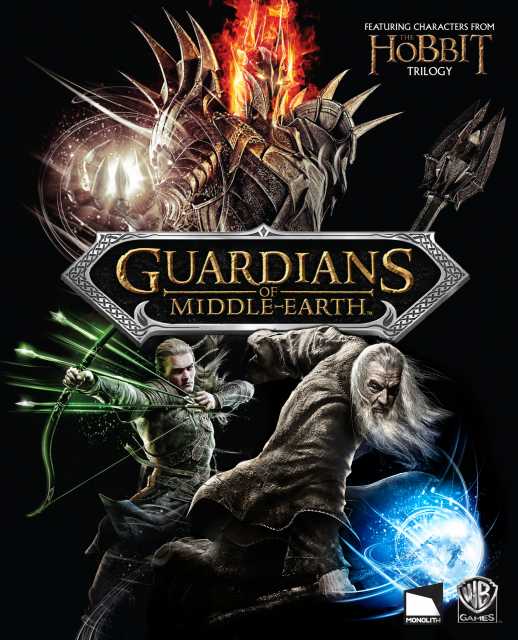Three Lanes to Rule them all...
Guardians of Middle-Earth is a game that seems at odds with itself at almost every turn. It's a MOBA - and a surprisingly competent one at that - made exclusively for consoles. Its use of the Lord of the Rings movie IP goes both too far and sometimes not enough. But perhaps most crucially and damning of all, it is an online only game that is rampant with constant networking issues. Guardians of Middle-Earth is a brave, bold move by Monolith to create an exciting ARTS experience for consoles that could actually work... if only if it actually worked more often.
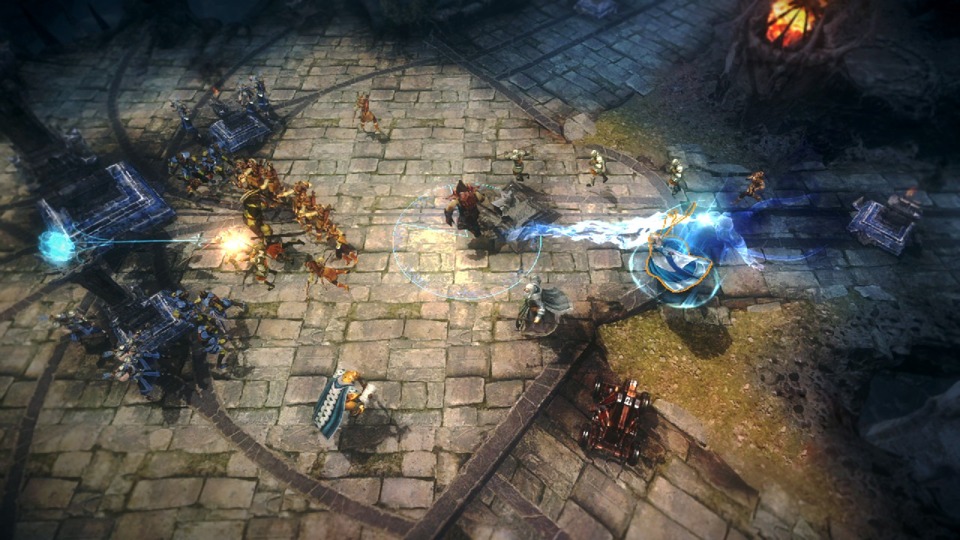
Like its genre counterparts before it, Guardians of Middle-Earth has a deceptively simple concept at its core: two teams of five heroes, known as the titular Guardians, battle their way across a symmetric, 3-laned battlefield in order to reach their enemies base and destroy it, taking out towers and enemy minions - represented by Galadhrim and Soldiers of Gondor for the forces of good, or Orcs and Goblins for their evil counterparts - along the way. As with other ARTS games, experience earned during a match (from killing minions, structures or taking down an enemy hero) is used to upgrade your Guardian character's set of 4 abilities, as well as their strength and health pool, increasing their potential threat on the battlefield as a match progresses. Although it all sounds very similar to other MOBA games, where Guardians of Middle-Earth succeeds is through bringing the heart of a MOBA's complex mechanics to consoles in a simplified, controller-friendly way, with a control scheme that, whilst not as detailed and nuanced as they are on PC, works surprisingly well given the limits of a controller. A Guardian's four special attacks are mapped to the face buttons, as well as a basic attack on the right trigger and a special attack known as Commands (akin to League of Legend's Summoner spells) on the left, with bumpers left to pull up menus to upgrade structures and abilities mid-combat. Although using the right stick to aim your abilities á la a dual-stick shooter layout can be a little finicky sometimes, overall Monolith have succeeded in bringing the core gameplay sensibilities of the ARTS genre to consoles that feels very good. The ebb and flow of MOBA combat is still there, tight controls and the complex character abilities like roots or movement-reducing debuffs too, and when a match gets going, it feels just as exciting and intense as it should.
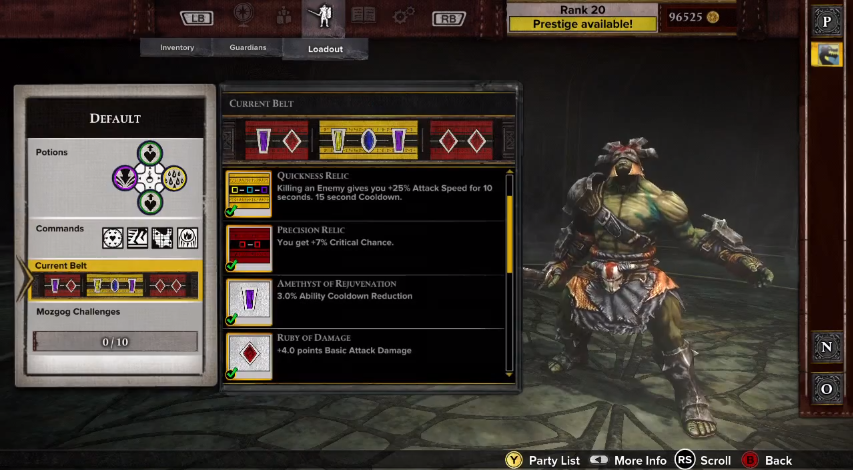
Where Guardians of Middle-Earth breaks from its peers is in the use of a Loadouts. Unlike other ARTS games where players earn currency during a match to purchase one-match-only potions and equipment to tweak their characters, here you can craft custom loadouts outside matches at an account level to use with any Guardian. Players select individual Gems or Relics (sets of sockets that when slotted with the right kind of gem, grant a more powerful boost than the gems would on their own) to place in a 'belt' that when equipped, and certain conditions in a match are met, activate boosters to tweak your character stats - boosting stats ranging from Max health or resistance boons and reduced cooldowns, to ability and basic attack damage increases. Between these Loadouts prepared in advance of a match and the simplified ranking up of your abilities mid-game (each of your 4 abilities have just 4 ranks for you to sink points into over, increasing their strength and changing little else about them), Guardians of Middle-Earth strikes a balance that allows you to focus less on the micro-management of a character mid-battle, and more on the combat, and on the whole it works in the game's favor.
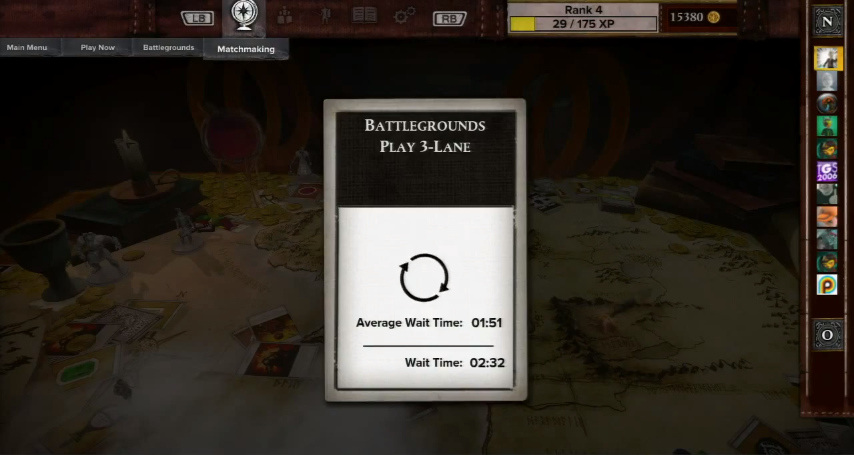
For all the good the quality of the gameplay is however, that hardly matters when it is a constant trouble simply trying to find - and stay in - a match. Lengthy queue times that far exceed the time the 'Average wait time' counter reads are abound every time you attempt to enter a game, and even when you do find a lobby, that's not necessarily a guarantee that things will go smoothly. Roughly half of the matches I have played throughout the launch week have ended prematurely, either from games not loading when the Lobby's ready counter hits zero (forcing you to quit back to the main menu and face a minute and a half long Matchmaking Ban), or from random disconnects, or mid-matches lockups as the game suddenly attempts to 'Resynchronise the Network' (once again eventually forcing you to quit out and face another Matchmaking ban). Although such issues could usually be put down to launch week woes, they crop up far too often to not mention - and they are all the more damning when matchmaking is pretty much the sole method of playing a match, outside of a single Training skirmish.
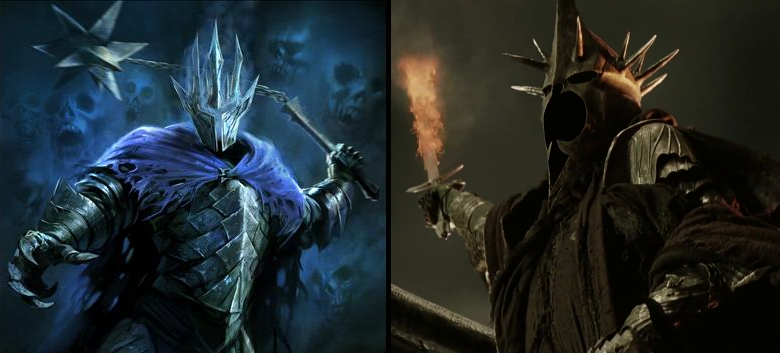
Guardians of Middle-Earth is just as hit and miss in its presentation as it is in its networking. Although character models, maps (although there are only two - a 3-laned map and a Single Lane map for quicker games - which seems a little light) and ability effects all look reasonably good and the framerate rarely dips below a smooth level when the fighting intensifies, the main detractor here is the art design. There are a wide variety of characters included from the films (as well some characters from the upcoming Hobbit Trilogy - however the majority of the characters from The Hobbit are locked behind a 1200 MSP Season Pass, the same cost of the game itself), ranging from main characters like Sauron, Éowyn or Gandalf, to more obscure characters from the films such as Orc Lieutenant Gothmog, or even more obscure characters from Tolkien's wider Middle-Earth, such as Beregond, a Captain of Gondor, and Hildifons Took, a hobbit engineer. Whilst this variety is good, there is an odd level of inconsistency between highlighting the game's ties to the visuals of the Peter Jackson films rather than Tolkien's novels, and new designs for some characters that just feels odd. Gandalf, Legolas, Nori and Galadriel, for example, all bear more than a passing resemblance to their movie looks, in both facial features and their outfits. However other characters that have appeared in the movies - specifically The Witch-King, Sauron, Haldir and Gothmog - have original designs that look completely different to their movie counterparts. Whilst these new looks aren't necessarily bad, standing alongside the 'movie' designs, they look incredibly out of place and seem like a bizarre design choice considering Warner Bros. are putting the game out to capitalise in fan interest from upcoming The Hobbit movie. This inconsistency even carries over into the Menus of the game, where backgrounds and loading screens use a board game-esque motif that isn't actually reflected elsewhere in the game at all. None of these criticism are exactly dire on their own, but they add up to give a scatter-shot feel to the presentation that ultimately fails to do anything beyond basic competence.
Guardians of Middle-Earth should have been a pleasant surprise. It's a console MOBA that works, a Licensed game that at its core isn't just a completely worthless cash grab. When you get into a stable game with full teams of Human players, its solid and enjoyable gameplay shines, but that experience is unfortunately too infrequent. These networking issues plague the game at every turn, and in an online-focused title like this, these errors make it almost impossible to to recommend, even to hardcore Lord of the Rings fans who might be currently whipped up into a Tolkien fever. A certain Grey Wizard may have once written that ''Not all those who wander are lost'', but Guardians of Middle-Earth is definitely a game that struggles to find its way.
